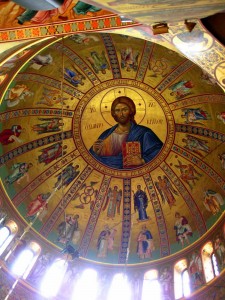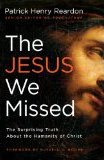 by Fr. Patrick Henry Reardon
by Fr. Patrick Henry Reardon
Times out of mind various Orthodox converts—others, as well—have asked me to write something about the differences between Orthodox and Western theologies of Redemption. My reluctance to comply with this request is based on several considerations:
First, at present there appears to be no shortage of efforts to contrast Western and Orthodox views on various theological themes. Judging from the works familiar to me, I fear they succeed mainly by oversimplifications—not to say distortions—of the subject. Anyway, if Orthodox Christians feel they need yet another work of theological polemics, I am not the man to write it.
Second, the request seems to suppose that there is only one legitimate Orthodox theology of Redemption. In fact, this has never been the case.
In matters of defined dogma, Orthodox Christians speak with a common voice, but within those established dogmatic strictures we should expect—as certainly we will get—a considerable variety of theologies within the Church. One can observe this phenomenon all the way back to the Bible itself, where the sundry inspired writers contemplate the Mystery of Christ from different directions.

Third, I prefer to approach the theology of Salvation—Soteriology—from the perspective of what I think of as Existential Christology. I hope to explain better, in due course, what I mean by this, but let me mention, for now, that these reflections on Soteriology will extend certain thematic lines I drew in The Jesus We Missed.
A chief difficulty is determining where to start this work. In an earlier stage of its planning, I had thought to commence with the triadic soteriological outline of St. Maximus the Confessor. He began with man’s ultimate destiny: participation in the divine life, the foundation of which is God’s participation in human life, the Incarnation. There is much to recommend this approach, in which the goal or telos of Salvation is the first thing to consider.
This is not the seventh century, however; I am not fighting the Monothelites, nor am I a Maximus. Although I will appeal to this great Father for guidance along the way, I want to start the present reflections from another direction.
What I must be careful to do is begin within the suppositions of Sacred Theology. For example, even if I were to start this work with the consideration of sin, I would want to make sure we understood sin in a properly theological sense. Often enough, I’m afraid, this is not the case. As I hope to illustrate later, St. Anselm’s foundational mistake was to start his Soteriology by considering sin from outside a true theological framework. As he took care to tell us, Anselm started with sin in general religious terms as an offense against the divine honor.
As a properly theological concept, however, sin means a great deal more; it is less an offense against God than the utter destruction of man. Christians believe, with the Apostle Paul, that sin reigns in death. Consequently, if these reflections on Salvation were to start with sin, we should direct our first attention to mortality and corruption.
Anyway, I plan to begin these reflections with what the Apostle Paul calls the nous Christou (1 Corinthians 2:16). With respect to this term, I am not confident that the usual translation, “the mind of Christ,” does entire justice to its context at the end of 1 Corinthians 2. Perhaps “Christ’s perception” is closer to the mark, as the Vulgate’s translation, sensus Christi, indicates.
If I understand Paul correctly, the nous Christou is how Christ himself understands
“the things freely given to us by God”—ta hypo tou Theou charisthenta hemin (2:12).
And we are given this same perception of Christ, this nous Christou, by the Holy Spirit (2:10-14). It is in the Holy Spirit that the Church thinks theologically.
This is the ministry of God’s Word, in which
“we speak in words—not in the teachings of human wisdom, but in the teachings of the Spirit—assessing spiritual things with spiritual” (2:13).
I take this sensus Christi to be the proper supposition and the final purpose of Sacred Theology.
If the subject of Soteriology is approached in this way—and if the word “Salvation” is taken to summarize “the things freely given to us by God”—the first question Sacred Theology may want to ask is,
“Just what did Jesus the Savior think he was doing in the work of Salvation? How did the God-Man perceive what he was about? What, in his mind, were “the things of my Father” that he had to accomplish? What was Jesus’ own sense of Redemption?”
If it is true that
“all things that I heard from my Father I have made known to you” (John 15:15),
this appears to be a good place to start.
